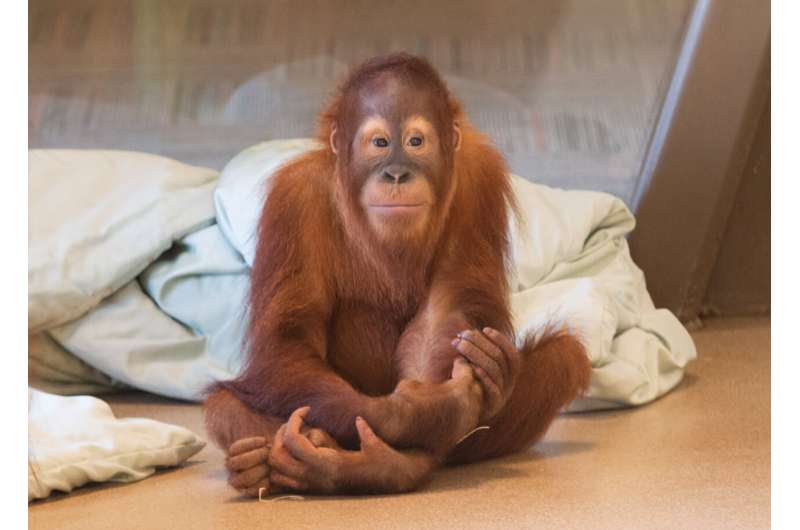This article has been reviewed according to Science X's editorial process and policies. Editors have highlighted the following attributes while ensuring the content's credibility:
fact-checked
peer-reviewed publication
trusted source
proofread
Researchers diagnose Indianapolis Zoo orangutan with rare genetic disease

Researchers from Indiana University School of Medicine have diagnosed a Sumatran Orangutan at the Indianapolis Zoo with a rare genetic disease called Alkaptonuria. This is the first time the disease has been confirmed molecularly in a primate other than a human.
The six-year-old orangutan, named Mila, was born at the Indianapolis Zoo in 2016. Mila had a history of dark urine that turned brown upon standing since birth, but has never shown other symptoms. Researchers from the IU School of Medicine Department of Medical and Molecular Genetics collected and analyzed DNA, diagnosing Mila with alkaptonuria.
The research team recently published their findings in Molecular Genetics and Metabolism.
"This was an unexpected finding that ended years of questions about this animal," said Marcus Miller, Ph.D., assistant professor of clinical medical and molecular genetics and principal investigator of the study. "We're proud of this collaborative effort with the zoo that will hopefully lead to better care and treatment of Mila moving forward."
Alkaptonuria is a rare, autosomal recessive disorder caused by deficiency of an enzyme called homogentisate 1,2-dioxygenase. As an infant, the only symptom is urine that turns black upon standing. Symptoms typically progress slowly, but can lead to chronic joint pain and decreased mobility later in life.
There have been several reports of the disease in non-human primates, but never any long-term studies, so it is unclear how the disease will impact Mila over time. However, having this diagnosis means that veterinarians don't have to worry about other potential issues.
"I think the best part about these results is we can de-escalate some of the other studies that might have been recommended," said Theodore Wilson, MD, assistant professor of clinical medical and molecular genetics. "We don't need to use anesthesia for imaging, obtain a kidney biopsy or have guests or veterinarians worried. Even though her urine does still turn dark after being out in the environment, fortunately, now it doesn't need to be a problem that is alarming."
"People with this disease typically don't develop symptoms until much later in life, usually in their 30s or 40s," said Melissa Fayette, DVM, associate veterinarian for the Indianapolis Zoo. "We will continue to monitor Mila closely and perform regular preventive health exams to detect any secondary pathologies that may arise."
More information: Melissa A. Fayette et al, Biochemical and molecular confirmation of alkaptonuria in a Sumatran orangutan (Pongo abelii), Molecular Genetics and Metabolism (2023). DOI: 10.1016/j.ymgme.2023.107628
Journal information: Molecular Genetics and Metabolism
Provided by Indiana University School of Medicine



















